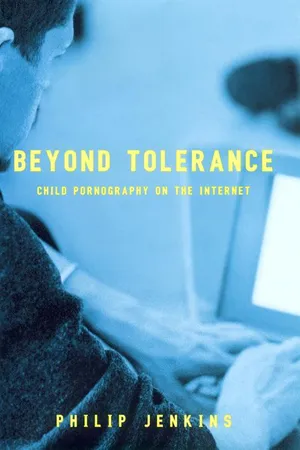![]()
NOTES
Notes to Chapter 1
1. The quote is from “Helena Lover” on the main discussion board (BBS2) of the Maestro Web site, February 6, 2000. As I will explain, “Maestro” is a pseudonym, and I will not publish the actual URL of this site. Henceforward, all quotations from this site will be introduced with the prefix MB.
2. MB: “Don’t Know,” October 29, 1999.
3. New York v. Ferber, 458 U.S. 747, 1982.
4. A large and growing literature deals with the legal and constitutional challenges involved in regulating the Internet. See, for example, William S. Byassee, “Jurisdiction of Cyberspace,” Wake Forest Law Review 30 (1995): 197–220; J. Q. Crews, “Regulating Pornography on the Internet,” Law and Psychology Review 20 (1996): 179–195; Lilian Edwards and Charlotte Waelde, Law and the Internet (Oxford: Hart, 1997); Lesli C. Esposito, “Regulating the Internet,” Case Western Reserve Journal of International Law 30 (1998): 541–565; Mark J. Stefik, The Internet Edge (Cambridge, MA: MIT Press, 1999); Jean Hellwege, “Law Enforcement, Legislators Grapple with Child Sexual Exploitation on the Net,” Trial, March 2000, 13–16; S. J. Drucker and G. Gumpert, “CyberCrime and Punishment,” Critical Studies in Media Communication 17 (June 2000): 133–158.
5. Ian Hacking, The Social Construction of What? (Cambridge, MA: Harvard University Press, 1999); Philip Jenkins, “Fighting Terrorism as if Women Mattered,” in Jeff Ferrell and Neil Websdale, eds., Making Trouble (Hawthorne, NY: Aldine de Gruyter, 1999), 319–346; Philip Jenkins, Synthetic Panics (New York: New York University Press, 1999).
6. Philip Jenkins, Moral Panic (New Haven, CT: Yale University Press, 1998), 209–213; Jim Exon, “At Issue: Should the Government Crack Down on Pornography on the Internet?” CQ Researcher 5 (24), June 30, 1995; Cyberporn and Children: Hearing before the Committee on the Judiciary, US Senate, 104th Congress, 1st session … July 24, 1995 (Washington, DC: GPO, 1995); Cyberporn: Protecting Our Children from the Back Alleys of the Internet. Joint Hearing before the Subcommittee on Basic Research and the Subcommittee on Technology of the Committee on Science, US House of Representatives, 104th Congress, First Session, July 26, 1995 (Washington, DC: GPO, 1995). The cyberporn issue by no means died with the CDA. See, for instance, Internet Indecency: Hearing before the Committee on Commerce, Science, and Transportation, US Senate, 105th Congress, Second Session, February 10, 1998 (Washington, DC: GPO, 1999); Legislative Proposals to Protect Children from Inappropriate Materials on the Internet: Hearing before the Subcommittee on Telecommunications, Trade, and Consumer Protection of the Committee on Commerce, House of Representatives, 105th Congress, Second Session, … September 11, 1998 (Washington, DC: GPO, 1998); “More People Named to Panel for Curbs on Web Pornography,” WSJ, October 20, 1999; Jeri Clausing, “Commission Will Work to Protect Children after Legislation Fails,” NYT, March 7, 2000.
7. Yaron Svoray and Thomas Hughes, Gods of Death (New York: Simon and Schuster, 1997).
8. Use of Computers in the Sexual Exploitation of Children (Washington, DC: U.S. Dept. of Justice, Office of Justice Programs, Office of Juvenile Justice and Delinquency Prevention, 1999).
9. LeRoy G. Schultz, “Kiddie Porn”: A Social Policy Analysis (Morgantown, WV: School of Social Work, West Virginia University, 1977); Shirley O’Brien, Child Pornography (Dubuque, IA: Kendall Hunt, 1983); Kenneth V. Lanning and Ann W. Burgess, Child Pornography and Sex Rings (Washington, DC: FBI, U.S. Dept. of Justice, 1984); Ann W. Burgess and Marieanne L. Clark, eds., Child Pornography and Sex Rings (Lexington, MA: LexingtonBooks, 1984); Howard A. Davidson and Gregory A. Loken, Child Pornography and Prostitution (Washington, DC: NCMEC, 1987); Patricia N. Chock, “The Use of Computers in the Sexual Exploitation of Children and Child Pornography,” Computer Law Journal 7 (1987): 383–407; D. Campagna and D. Poffenberger, The Sexual Trafficking of Children (Dover, MA: Auburn House, 1988); Kenneth V. Lanning, Child Sex Rings (Washington, DC: NCMEC, 1989); Tim Tate, Child Pornography (London: Methuen, 1990); Jan Schuijer and Benjamin Rossen, “The Trade in Child Pornography,” Issues in Child Abuse Accusations 4 (1992): 55–107. For more up-to-date studies, see Carl Goran Svedin, Kristina Back, and Radda Barnen, Children Who Don’t Speak Out (Stockholm, Sweden: Swedish Save the Children, 1996); Ronald Weitzer, ed., Sex for Sale (New York: Routledge 1999); Anna Grant, Fiona David, and Peter Grabosky, “Child Pornography in the Digital Age,” in Phil Williams, ed., Illegal Immigration and Commercial Sex (London: Frank Cass, 1999), 171–188; Yaman Akdeniz, Sex on the Net (London: South Street, 1999). For contemporary European writing, see, for instance, Gisela Wuttke, Kinderprostitution, Kinderpornographie, Tourismus (Gottingen: Lamuv, 1998); Detlef Drewes, Kinder im Datennetz: Pornographie und Prostitution in den neuen Medien (Frankfurt am Main: Eichborn, 1995). Carlos A. Arnaldo, ed., Child Abuse on the Internet (New York: Berghahn Books, 2000).
10. Laurie J. Flynn, “Guardian Angels Now Patrol the Net” NYT, March 16, 1996; Cybersex Cop, documentary program broadcast on A&E network, 1998. Keith A. Schroeder and Julie Ledger, eds., Life and Death on the Internet (Supple Publishing, 1998); Deborah Boehle, “Terrorized on the Internet,” Woman’s Day; March 9, 1999, 22–27; Stephanie Mansfield; “The Avengers Online,” Good Housekeeping, June 1999, 122–125+; Sean Kelly and Karen E. Crummy, “Netting Sexual Predators,” Denver Post, November 8, 1999; Catherine Edwards, “Pedophiles Prowl the Internet,” Insight on the News, February 28, 2000; “Gumshoe Mom Helps Collar Criminals On Line,” Centre Daily Times (State College, PA), March 13, 2000; Katherine Tarbox, Katie.com: My Story (New York: E. P. Dutton, 2000); Anita Hamilton, “Chatting with the Enemy,” Time, May 8, 2000, 95; Peter A. Carlin and Barbara Surk, “Cyber Survivor,” People Weekly, May 29, 2000, 95–96; Michelle Malkin, “Parental Neglect Leads Teen-agers to Be Seduced on the Internet,” Insight on the News, June 5, 2000; Debra West, “Afte...
